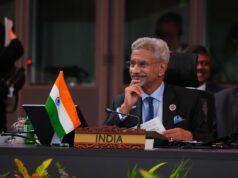As investigators try to join the dots to unravel the plot behind the blast that rocked Delhi earlier this week, there appears to be a clear link to Jaish-e-Mohammed, a Pakistan-based terrorist group. Information available in public is limited but the Jaish link indicates an external dimension, says Ramanathan Kumar, former Special Secretary of Research and Analysis Wing (R&AW).
More evidence will emerge as time progresses but I think it is also not wise to let Pakistan off the hook, Kumar told StratNews Global Editor-in-Chief Nitin A. Gokhale. He pointed to some key questions—If there was external sponsorship, to what extent? Was it externally inspired, externally guided, externally operationalised and what were the degrees of control by handlers in Pakistan.
In the run-up to the Delhi blast, there were a few ‘white collar’ arrests, doctors to be precise, and a cache of explosive materials seized in Faridabad, bordering the national capital. All this being the result of a probe that began after Jaish posters surfaced in Kashmir. The trail led to a doctor in Saharanpur and then to a hospital in Faridabad district. And the man who drove the explosives-laden car to Old Delhi was a medic from the Valley.
Intelligence Failure?
In Intelligence and even in counter-terrorism, often it’s the question of determining whether the glass is half-full or half-empty, says Kumar. He likens an attack to a goalkeeper allowing the opposition to score a goal. So many other saves may have been effected, which are either taken for granted or go unnoticed.
“Even before the Delhi attack took place, other parts of the network had been detected, people had been picked up and explosives had been recovered. Those are successes. But the fact that the attack took place and people were killed is a failure. So often in this business, failure and success go hand-in-hand.”
‘A Work In Progress’
Terrorism thrives in conditions where individuals or communities feel strongly aggrieved, says Kumar. And India would do well to ensure conditions that favour terrorism don’t exist. He recalls the note that BK Nehru, who was J&K Governor in the 1980s, wrote to then Central government, cautioning it against dismissing the state government led by Farooq Abdullah.
“The slow integration of the Kashmiri Muslims into the mainstream will suffer a setback if the government is dismissed. The secessionists will gain the upper hand, and suppressing them by force is not a solution,” the Governor had written.
That slow integration of Kashmiri Muslims into the Indian mainstream still remains a work in progress, says Kumar.
Nitin A. Gokhale is a media entrepreneur, one of South Asia's leading strategic affairs analyst and author of over a dozen books so far on military history, insurgencies and wars.
Starting his career in journalism in 1983, he has since led teams of journalists across media platforms.
A specialist in conflict coverage, Gokhale has covered the insurgencies in India’s North-East, the 1999 Kargil conflict and Sri Lanka’s Eelam War IV between 2006-2009.
Gokhale now travels across the globe to speak at seminars and conferences, and lecture at India’s premier defence colleges. He has founded three niche portals, Bharatshakti.in, stratnewsglobal.com and Interstellar.news.




